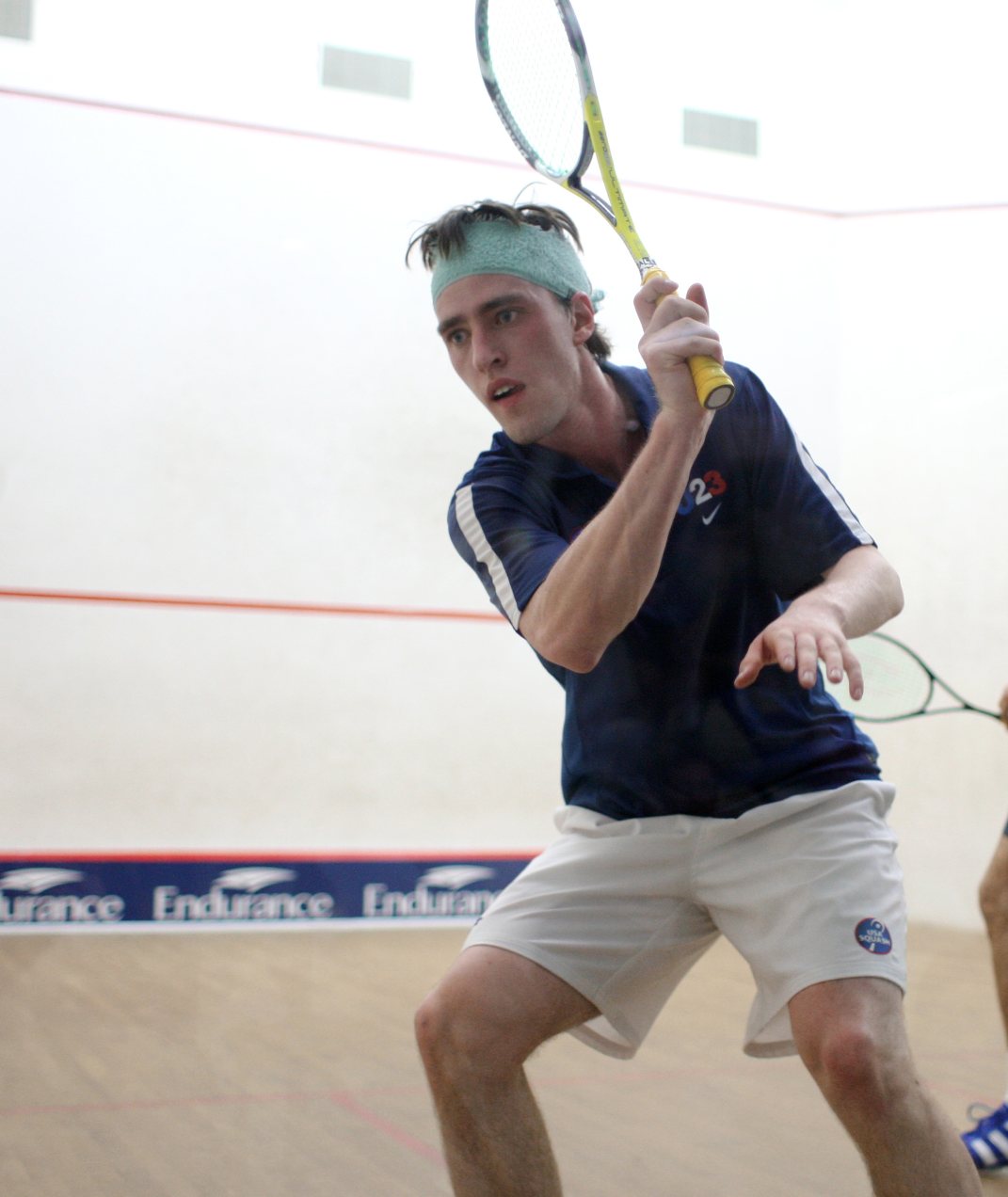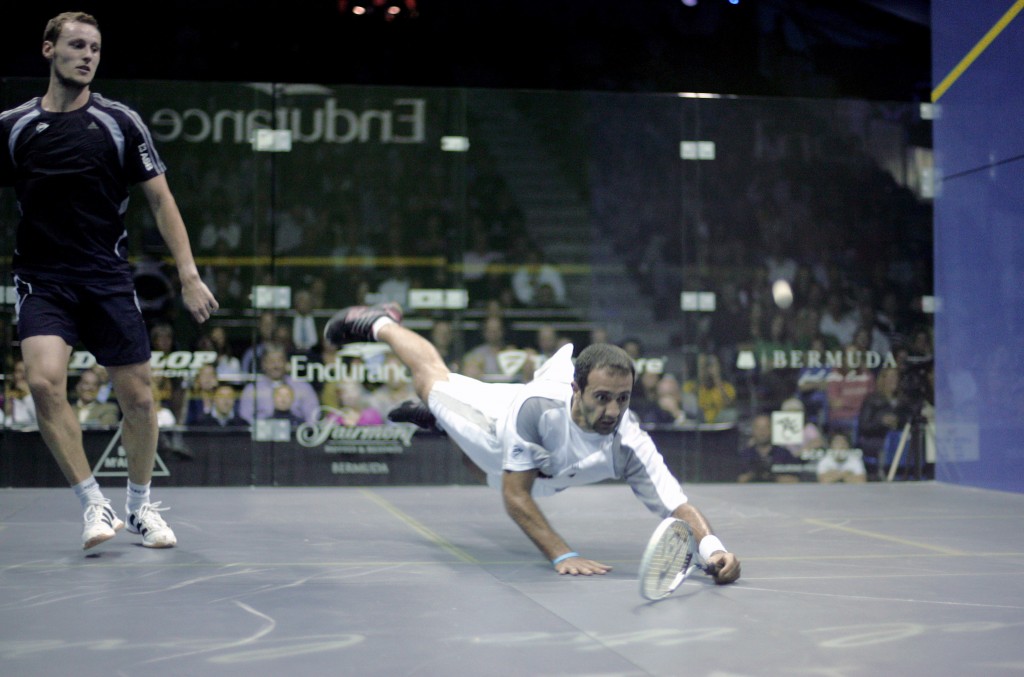
By James Zug
Photos by Steve Line/SquashPics.com
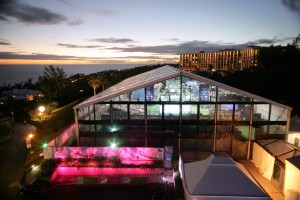 I could see it in the warmup. From the moment Gregory Gaultier came onto the court for the final of the Endurance World Open 2007, swept there by the flashing spotlights, the booming voice of Robert Edwards and the blasting theme song of the “Pink Panther,” he was clearly amped. He hopped side-to-side, jogging in place. Edwards brought out his opponent, Amr Shabana. It was a study in contrasts. While Edwards finished his prattling bombast, Shabana stood still. Gaultier jiggled like a bowl of jelly on a fault line. Then, Edwards’ signature line, “Let’s Play Squash,” and they warmed up.
I could see it in the warmup. From the moment Gregory Gaultier came onto the court for the final of the Endurance World Open 2007, swept there by the flashing spotlights, the booming voice of Robert Edwards and the blasting theme song of the “Pink Panther,” he was clearly amped. He hopped side-to-side, jogging in place. Edwards brought out his opponent, Amr Shabana. It was a study in contrasts. While Edwards finished his prattling bombast, Shabana stood still. Gaultier jiggled like a bowl of jelly on a fault line. Then, Edwards’ signature line, “Let’s Play Squash,” and they warmed up.
Gaultier crushed the ball each time his racquet swung. He was not loosening up. He hit out, full force, maximum impact. I thought, oh boy, he’s really wound tight at as a drum. Most players like to come out on the first point at full speed, but Gaultier was beyond that. He lead-footed the pedal to the floor. The first points were all his. Shabana, with his sloe-eyed shamble, was barely on the highway. His rails kept squirting off the side wall near the front, squibbing right into the middle of the court. One went for a stroke, another two he had to exaggerate his retreat from the T in order to allow Gaultier space. Gaultier smashed and hammered, pin-wheeling, no lobs, no drifting boasts, pure speed, unadulterated adrenalin. He wiped his playing hand on the back wall after the first point—he was already soaked with sweat.
It was 4-1. Shabana pipped two lucky points on Gaultier tins. Then at 4-3, Shabana, warmed up and his eye finally in, started swinging his shots into place and the game log-jammed, two long points ending in lets. The first test. Shabana broke it, with a clean forehand winner into the nick. In the next thirty seconds he grabbed four more points on four more nicks.
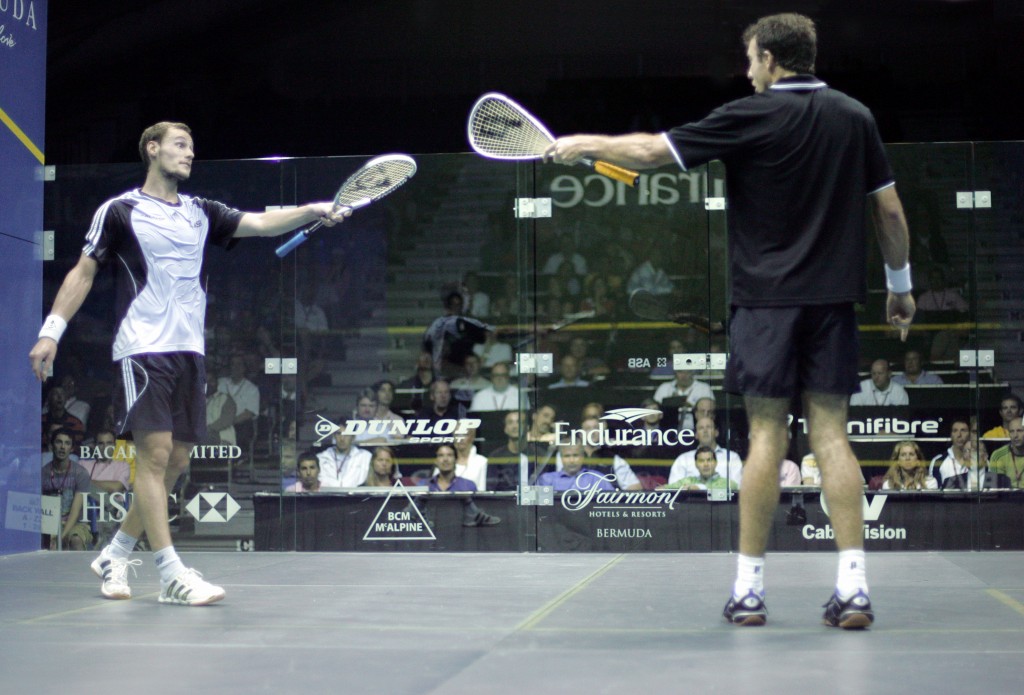
The match was over. Gaultier looked bewildered, nonplussed, sluggish. He had burned out. After last year’s debacle when he blew five match points in the World Open final against David Palmer, Gaultier had ramped himself to such a fervor this night that at the first push, he crumpled. He was a bundle of newspapers tossed on a fire, burning brightly for a moment, then ash. The first game took 20 minutes, the majority of which were those first eight points. The second game lasted seven minutes, the third ten. It was the shortest, most one-sided World Open final in history.
This is not to say that Shabana had nothing to do with his victory. With his usual sangfroid, he played beautifully. He made a couple of unforced errors and tinned a few shots, but for long stretches he vivisected the court with scalpel-like precision. Twice in the second game he backpedaled, leapt and spun the ball, on his forehand, into the left corner—front wall, side wall, dead nick. Incredible. “Once or twice in your life, you play like this,” Shabana told me afterwards, having zoomed, at 4-3, into a magical zone. But Gaultier had applied no pressure and so it was a loose-swinging, flowing Shabana on display, not a care in the world.

The grace note that night was the powder-puff blue rubber bracelet, a la Lance Armstrong’s yellow Live Strong ones, that tournament director Ross Triffitt had given to each player last year. Shabana wore his on his right wrist, both in the publicity photo with sea-water lapping up the court and on the last night. It bore the island’s new marketing motto: Feel the Love.
Bermuda was a loving place. Squash had come to the little (13,000 acres; 65,000 people) island in the middle of the Atlantic in the 1930s, with open-air concrete courts at two of Bermuda’s military bases. A couple of private courts sprung up and in 1962 Leslie Harmer, the island’s telephone company operator, became the first president of the Bermuda SRA. Six years later a dozen friends joined him in tossing in £3,000 each to build a two-court complex in the Devonshire parish of Bermuda (they added two more six years later). In 1969 they started the Bermuda Invitational, which after the Hyder, was the oldest softball tournament this side of the Atlantic. The Invitational, sponsored by Pan Am and then British Airways, was the answer to a number of juicy trivia questions (Where did Henri Salaun play and win his one and only softball tournament, in 1969? Where did one player come onto the court after a mid-match, fully-clothed shower? Where did one two-time winner get pulled, literally, off the beach and deported due to global political infractions?) and a major cause of Bermuda’s slow but steady integration into North American squash.
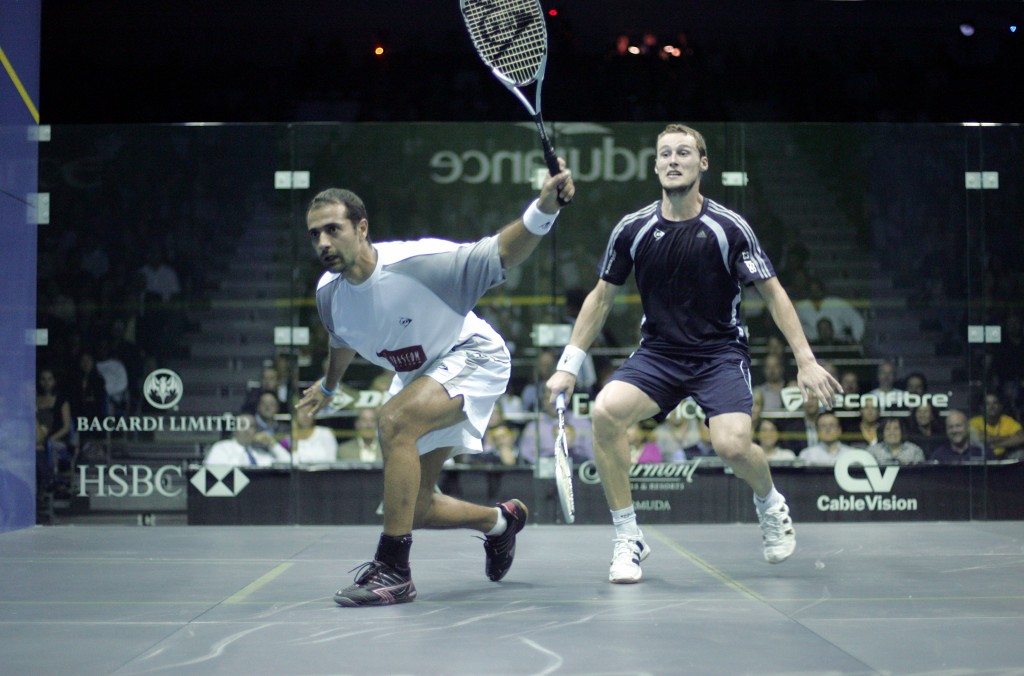
Professional squash arrived in November 1989 with the first Bermuda Open. It had winners like Brett Martin, Gary Waite and Simon Parke (all belying Edwards’ condescending announcement to the crowd at the World Open finals that “all you knew four years ago was exhibition squash”). The Bermuda Open ran until 1996 and then returned in 2003. The following year, Ross Triffitt, the director of the BSRA squash program, moved the tournament to a girls’ high school gymnasium in Hamilton. They then staged two PSA Masters tournaments there, but a World Open needed a more glamorous venue (and larger, as just 600 spectators could fit in the gym) and so Triffitt moved it to the very posh Fairmont Southampton, which looms up on a hill near the Gibb’s lighthouse along Bermuda’s south shore, just above the pink sands of Horseshoe Cove.
They staged the Endurance World Open 2007 in a massive, $350,000, 16,000 square foot, 43-feet high, warehouse-like tent in the hotel parking lot. During the day, through the transparent, Saran Wrap plastic covering the walls, you could see the ocean a quarter mile below, as Shabana’s marketing shot suggested. At night, when the matches were played, it went black and it could have been a parking lot in Schenectady.
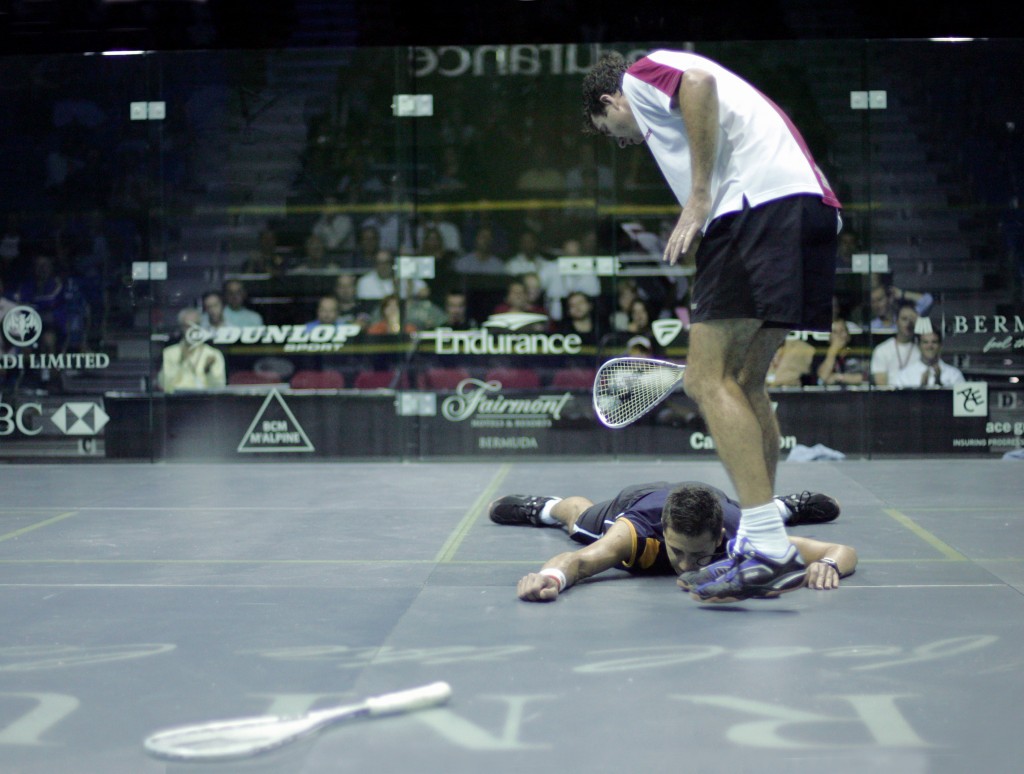
But the World Open still exuded a unique Bermudian atmosphere. Chinese lanterns and arching tubes glowingly guarded the entrance. More than a dozen video screens studded the room, showing replays on most points. Rumblossomed, Bermuda-shorted men drank their swizzles in a velvet-roped, second-story, flag-bedecked VIP lounge that overlooked the left wall. The VIP lounge had a VIP section for Endurance folks (they are an insurance and re-insurance, NYSE-listed firm). The finals featured a vintage-dressed Bermudian town crier and a gombey dance troupe whose colorful costumes and thumping beat provided the night’s best excitement. The crowd were fine, but not sterling—many tickets were available for the later rounds and at the final some of the best kiester-holders in the 1,400-seat arena, behind the front wall, were empty. A bunch of Americans came across—half of a fifty-child junior tournament draw consisted of Americans—but most of the crowd was local and social. The island’s newspapers gave front-page coverage. The hordes of autograph seekers swarmed the players, though Jahangir Khan, there for the World Squash Federation meeting, still attracted his share.
The one hiccup was the floor. ASB trotted out its new glass floor, which is perfect for advertising but a bit slippery for the players. It had been used in Hong Kong and Saudi Arabia, with minor complaints, but here in humid, damp Bermuda, it became lethally dangerous. Everyone slipped. A dozen times, two dozen times a game, players called in a fleet of busy children armed with mops. The disruption tore through the notion of exhausting the opponent, as the players usually left the court to regroup and towel off during the two-minute break. The only match not disfigured was the final. A storm had brushed the island that afternoon, catching me and a few other tourists out on their scooters, and cooled off the temperature a bit. And the match was so short, that no one really sweated. (There was just one call, in the third game, to the moppers.)
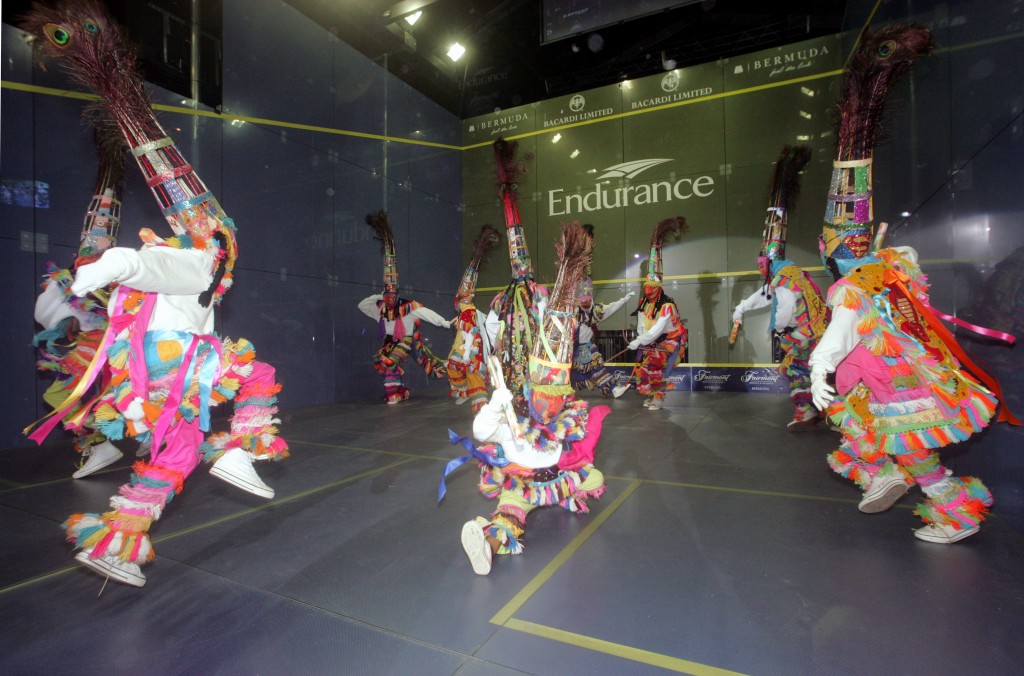
The World Open had some great moments early-on. Julian Illingworth added another historic notch to his belt, when he became the first American to qualify into a World Open by stunning Omar Elborolossy (former No. 14 in the world) in three in the qualies. Illingworth then nipped at Thierry Lincou’s heels, taking a game and staying on court for 42 minutes. Alex Gough, a week shy of his 37th birthday, turned back the clock to reach the quarters, while Omar Mossad, half his age, put notice that he could be the next great Egyptian. James Willstrop hammered through two straight 90-minute five gamers, only to get stopped short by his friend Nick Matthew. Matthew’s parents and aunt and uncle cheered loudly and blogged about the tournament. David Palmer, who for years has sojourned in a friend’s cottage in Bermuda, had the most crowd support in the later rounds, with a bevy of kids snapping tournament Thunderstix together like this was a college basketball game. But Palmer went quietly against Shabana in the semis. He has a 6-6 head-to-head record against Shabana, but he hasn’t beaten him in three years, since the 2004 World Open quarters.
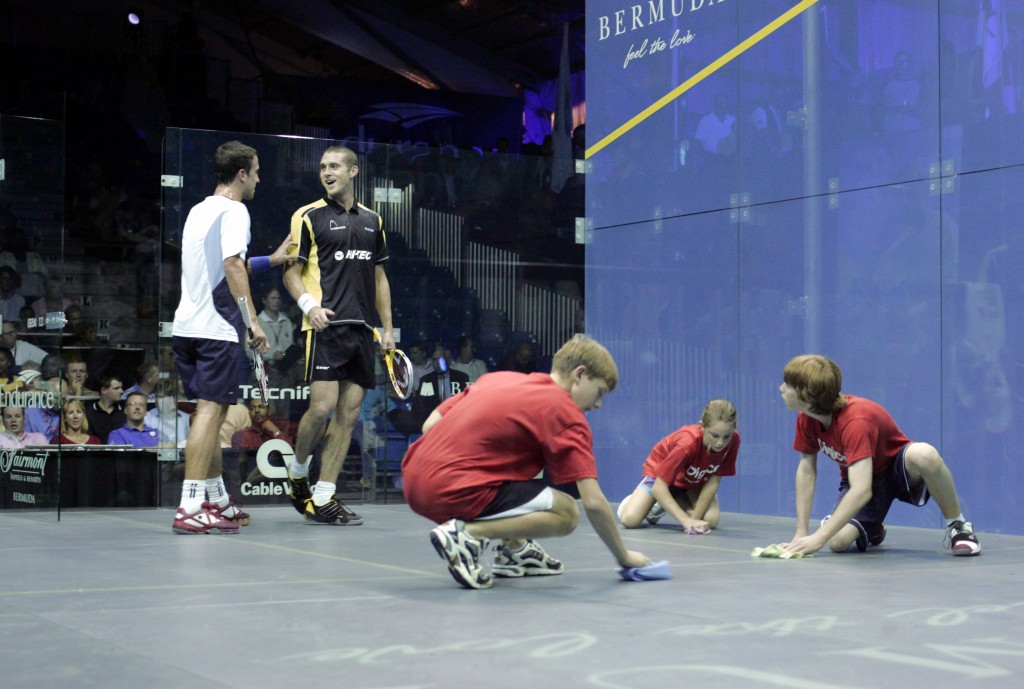
Shabana, the “Prince of Cairo” as Edwards insisted on dubbing him, shakily advanced through the rounds, giving up at least one game each match and never looking like his best performance ever was about to come. He looked a bit tired, having come to Bermuda after an unprecedented run in Asia. In the previous month he had won lucrative major tournaments in Saudi Arabia, Qatar and Hong Kong, beating Gaultier in the finals in the last two. But it had not been smooth. Shabana rarely was winning three love (both his Gaultier matches had lasted more than an hour and went to four close games) and he was weighed down with some urgency. His wife was expecting their first child, a daughter, on the first of March 2008 and Shabana was driving hard to take advantage of the last few tournaments before fatherhood descended.
Bermuda’s national motto, taken from the Aeneid, is quo fata ferunt—whither the fates carry us. They took Shabana to this little island in the sea and made him world champion. Now that is feeling the love.


